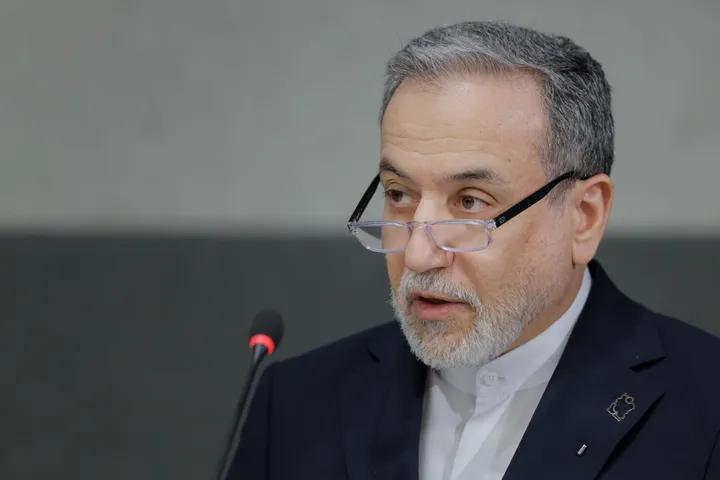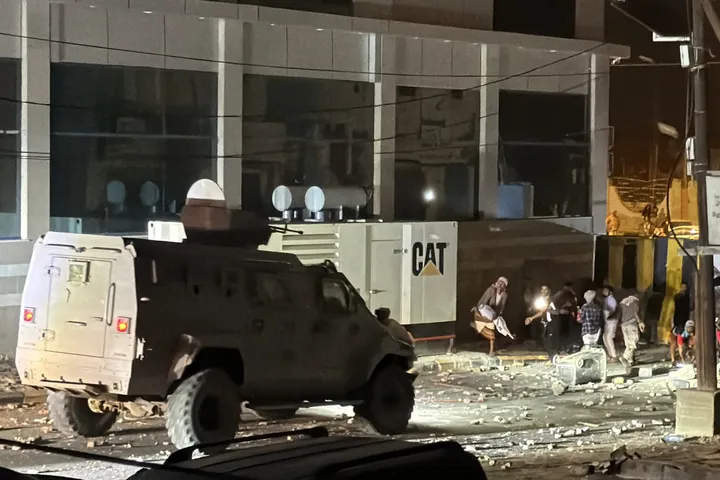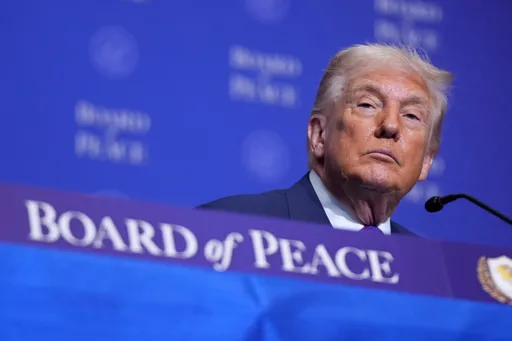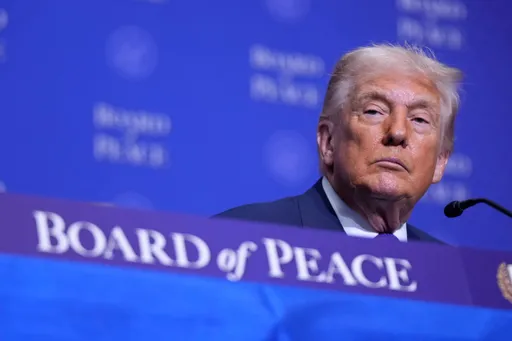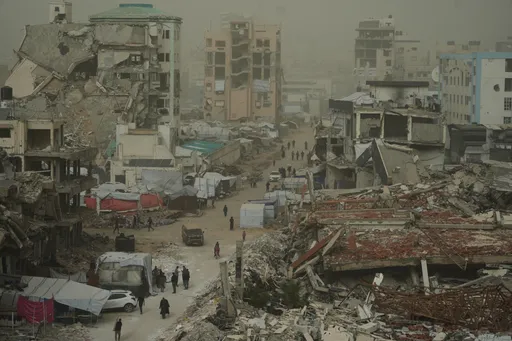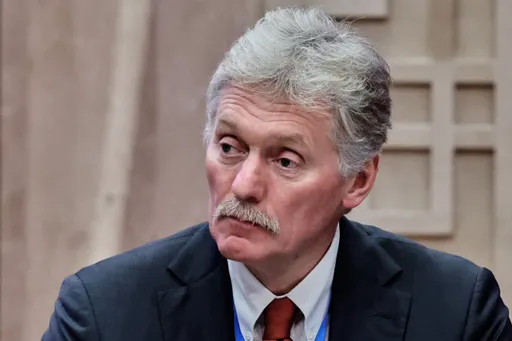Sunday Okoro, a public bus driver and 36-year-old father of four had to close for the day earlier than usual because of a rioting crowd in Orile, in Lagos, one afternoon in October last year. It was during the ENDSARS protests when thousands of Nigerian youth came out on the streets to protest against police brutality.
Rioters used the opportunity of the peaceful protests to vandalize Orile Police Divisional Headquarters. They broke into the police station and carted away with police ammunition, according to a court document which was seen by TRT World.
Okoro parked his bus and decided to take a walk to his house in the neighbourhood of Orile. His route went past the riot site. What he did not know was that while he walked past the rioters, he had accidentally walked into a picture which was taken by a bystander and circulated on social media.
Two months later in December, he had a scuffle with a man on his way to get bread for his family and was arrested. The man, Okoro alleged, had a relationship with the police and informed the officers about the picture. He has been remanded in Kirikiri Prison, a maximum prison in Lagos since then.
‘’I did not know anything concerning the ENDSARS protests, someone just snapped me. In the picture, they did not see anything in my hand,’’ Okoro told TRT World via a phone call.
He faces seven charges that include conspiracy to commit a felony, burglary of arms/ammunition, unlawful possession, armed robbery and unlawful assembly. His bail was set at 300,000 naira ($730), two sureties and one must be a blood relation, and three years’ tax clearance. For the bus driver and his family, the bail conditions are almost impossible.
Okoro is one of the unknown number of persons who were arrested by the Nigerian police during and after the protests and who are still in police custody or in jails across the country.
Neither the police nor the ministry of justice responded to requests for comments for this story.
ENDSARS Protests
The ENDSARS protests were a string of organic youth-led protests that took place in October last year across Nigeria. They were aimed at a now-defunct rogue police unit, the Special Anti-Robbery Squad (SARS) which was notorious for brutality and high-handedness.
Founded in 1992 following a spate of armed robbery in the country, SARS grew to be a law on its own. For Nigerian youths, years of accumulated grievances found an outlet when a video of members of the SARS unit killing a man in front of a hotel in Ughelli in Delta state and leaving the scene with the deceased’s car went viral early in October 2020. Heavy protests followed and they reverberated across the world.
The Nigerian government officially disbanded SARS on the 11th of October 2020 and immediately replaced the unit with the Special Weapon Tactical Team (SWAT). But this move which was seen as an inadequate response to the problems in the police force did not assuage thousands of Nigerian youth who had poured out to the street, defying arrests and police violence.
On the 20th of October, the Nigerian government deployed armed troops to Lekki, a major protest ground in Lagos, to disperse peaceful protesters. The operation left at least 10 dead and many injured according to Amnesty International. The Nigerian Army vehemently denied the shooting.
‘’Having been totally caught off guard by the groundswell of outrage over high-profile incidents of police violence against ordinary Nigerians, federal government officials pivoted from their initial non-acknowledgement and dismissals of the protests to attempting to placate protesters with vague, non-specific statements about 'police reform' that carefully elided the unambiguous demands for justice and accountability,’’ Chris Ogunmodede, an associate editor at World Politics Review with a speciality in comparative authoritarianism in West Africa, told TRT World.
Malicious and baseless
Robert Kpanou, a 29-year-old Beninese immigrant, was coming back from work on a motorcycle around noontime on the 23rd of October last year, when he was arrested with other people by the police and accused of partaking in the burning of Lekki Toll Gate.
Kpanou who is a tiler had just finished a commission at Banana Island, an exclusively upper-class area of Lagos, and was making his way to his home in Badagry. At that time, the state government had declared a curfew.
He said most of them were released after paying heavy bail to the police.
‘’I begged and begged them but they did not listen. They were taking me to different police stations until we got to Panti [The State Criminal Investigation Department],’’ Kpanou said. Like Okoro, he has been in Kirikiri Prison for the past 12 months.
Festus Ogun who currently provides pro bono counsel to Kpanou after his initial lawyer told him it was impossible to get him out told TRT World that representing Kpanou has been ‘’a really traumatic experience.’’
‘’The Nigerian criminal justice system was not designed to produce justice. The system is fashioned in a manner that oppresses and dehumanizes the poor,’’ the public interest lawyer said. ‘’The arrests should not have happened in the first place. The arrests [of random people after the protests] were malicious, baseless and a calculated attempt to persecute those who protested at the ENDSARS protests.’’
Kpanou’s last appearance in court was on the 24th of September but his case was adjourned till December 17 due to the absence of the magistrate. By the time he appears in court again, he will have spent fourteen months in jail without trial.
Nigerian Criminal Justice System
From April 6 till June 9, a 64-day span, all courts across Nigeria were closed down. The Judiciary Staff Union of Nigeria (JUSUN), the union body representing court workers, embarked on a strike over the non-implementation of the courts’ financial autonomy by the executive branch of the government.
The strike worsened the existing crisis within the judiciary. Backlogs of cases increased and added more strain to an already underfunded judiciary system. While the strike was on, people like Okoro and Kpanou had to endure the wait to see their day in court while being detained in prison.
‘’Any person with even the most basic knowledge of the carceral system in Nigeria would tell you that the overwhelming majority of people detained across the country have never been formally charged with a crime, with many of them held for months and even years,’’ Ogunmodede said.
In 2015, former president Goodluck Johnathan signed the Administration of Criminal Justice Act into law to ‘’promote the efficient management of criminal institutions’’. In spite of this law and other reforms, Ogunmodede assessed that criminal justice is still ‘’ pitifully slow, opaque and punishing on impoverished people.’’
‘’This is not just about the courts alone, or about the prison or even about the police. This is how the system and the structure of the justice system. It is not a mistake; it is designed for this purpose,’’ Ogun said.’
Prison conditions
Beyond the psychological implications of their imprisonment, both Okoro and Kpanou also have to contend with torturous prison conditions.
Okoro has contracted a skin infection and without access to proper medical attention in prison, his health is deteriorating.
‘’I don’t have any money, the money my wife too has spent it on securing my release. I will not pray to come back to this kind of place again in my life. I have learned my lesson, anywhere there is a riot, I will not pass through there,’’ he said, his voice hollow with regret.
As Kpanou looks forward to December when he hopes he appears in court again and at least get a bail, he makes do with unhygienic foods provided and he is unable to get help from outside.
‘’As I am here, to eat is a problem. I only have one brother in Lagos and he is unemployed. He has been unable to send money for me to eat. Prison food is bad and it affects our health,’’ he told TRT World, with a tone that has acquired the roughness of prison.
Ogunmodede sees the conditions as legacies of colonialism that produced the framework for modern police and prison institutions in Nigeria.
‘’In Nigeria, the modern police and the courts have their roots in carceral colonialism, where the unjust, dehumanizing conditions of courts and prisons reflect the harsh, violent conditions British colonial officers used to control local populations, especially individuals and groups resistant to their rule,’’ he said.
Okoro wants to go home to his family and Robert being imprisoned in a foreign country is not what he planned for when he migrated to live and work in Nigeria.
‘’Under the law, you are presumed innocent until the court says otherwise. Now the person who is presumed innocent under the law has been in custody for over a year, I do not think there can be any more punishment,’’ Ogun said. ‘’The Nigerian state is punishing people under the guise of prosecution. It is not prosecution; it is the persecution of innocent people who even never participated in the protest or violence. Let us even assume they participated in the protest; protest is still a fundamental human right.’’


